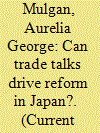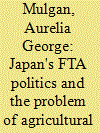| Srl | Item |
| 1 |
ID:
080909


|
|
|
|
|
| Publication |
2008.
|
| Summary/Abstract |
Neorealists argue that Japan's response to the rise of China has been to draw closer to the United States in order to balance Chinese power. In practice, the Koizumi and Abe administrations differed in their responses to the growth of Chinese power in East Asia. While Prime Minister Koizumi sought to consolidate the US-Japan alliance, Prime Minister Abe adopted a dual-track approach, combining enhanced bilateralism with enhanced regionalism. Although buttressing the US-Japan alliance, this strategy aimed to balance China by building a containment coalition with other Asia-Pacific states. Japan's signing of a security declaration with Australia in March 2007 was an important element of Abe's strategy, and marked a subtle shift in Japanese security policy from exclusive bilateralism to modest minilateralism. Although congruent with US strategic interests, this move supported Prime Minister Abe's ambition to exercise more autonomous influence over the regional security order
|
|
|
|
|
|
|
|
|
|
|
|
|
|
|
|
| 2 |
ID:
115617


|
|
|
| 3 |
ID:
082366


|
|
|
|
|
| Publication |
2008.
|
| Summary/Abstract |
Japan's willingness to negotiate Free Trade Agreements (FTAs) is not matched by a readiness to liberalise agricultural trade. Japan has used a variety of mechanisms to limit the extent of agricultural concessions in FTAs. Public choice theory predicts that FTAs are a more effective instrument for opening Japan's agricultural market than the WTO because they reshape the domestic politics of Japanese trade in ways that are conducive to further market opening. FTAs do this by altering the domestic politics of trade policymaking on the demand side as well as some aspects of the supply side. On the demand side, business groups mobilise even more strongly to demand an end to agricultural protection, whilst on the supply side, the value of FTAs for broader state interests are recognised by politician-leaders. Various structural obstacles in the policymaking process, however, prevent the altered demand and supply-side dynamics from necessarily delivering free trade outcomes.
|
|
|
|
|
|
|
|
|
|
|
|
|
|
|
|
| 4 |
ID:
058874


|
|
|
|
|
| Publication |
London, routledgeCurzon, 2005.
|
| Description |
xv, 296p.
|
| Series |
Nissan institute/RoutledgeCurzon Japanese studies series
|
| Standard Number |
0415346517
|
|
|
|
|
|
|
|
|
|
|
|
Copies: C:1/I:0,R:0,Q:0
Circulation
| Accession# | Call# | Current Location | Status | Policy | Location |
| 049152 | 338.1852/MUL 049152 | Main | On Shelf | General | |
|
|
|
|
| 5 |
ID:
081268


|
|
|
| 6 |
ID:
089684


|
|
|
|
|
| Publication |
2009.
|
| Summary/Abstract |
Japan's international standing rested almost exclusively on a narrow base of economic power. For the past four decades, it has been the second-largest economy in the world, yet Japan's political or military status has not since World War II been commensurate with its economic power. Today, Japan's global profile and international influence is diminishing even further.
|
|
|
|
|
|
|
|
|
|
|
|
|
|
|
|
| 7 |
ID:
072713


|
|
|
|
|
| Publication |
2005.
|
| Summary/Abstract |
This article challenges the prevailing view that China is displacing Japan as Asia's leader and the pre-eminent power in Asia. On the contrary, it argues that in understanding the future of Northeast Asia and the broader Asia-Pacific, it would be a mistake to look only to a rising China and to relegate Japan to a diminishing position. China's rise does not automatically herald Japan's decline. Japan is an emerging, not a retreating power. The rise of China is both obscuring and accelerating the transformation in Japan's regional and global position. Japan is increasing its economic power, technological capabilities, military reach, soft power and diplomatic influence. Furthermore, the rise of China makes Japan strategically more important to the United States and to other countries in the Asia Pacific. Japan will become the main regional counterweight to China and an indispensable partner in America's strategy of balancing China.
|
|
|
|
|
|
|
|
|
|
|
|
|
|
|
|